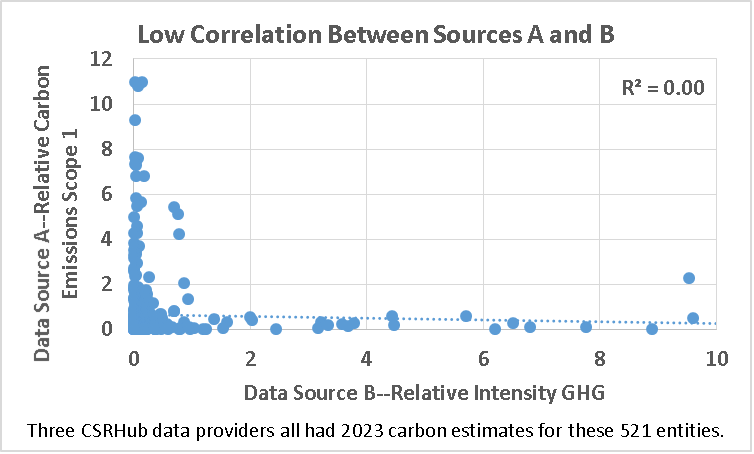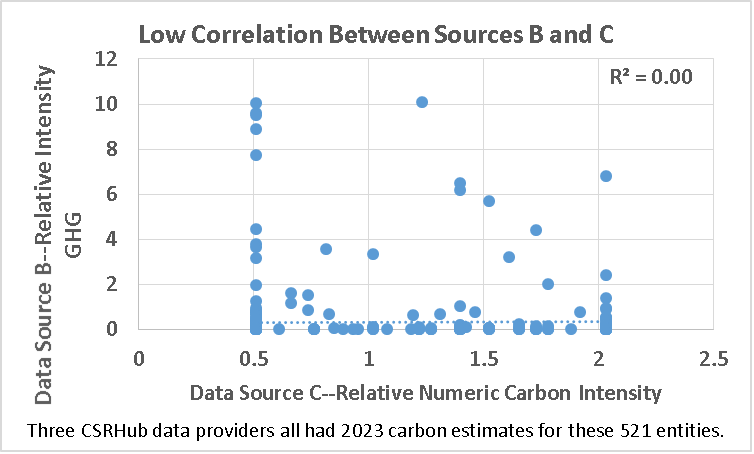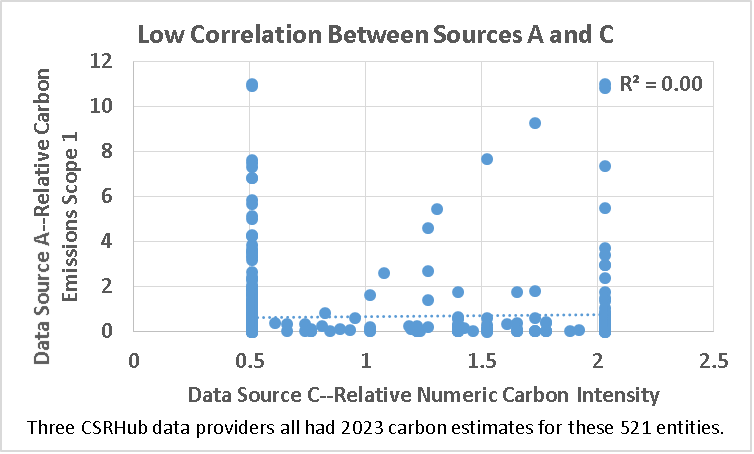Many groups are pushing corporations and other large entities to gather and publish data on their carbon emissions. The stated purpose of these efforts is that this data will inform public policy decisions on carbon use and drive investment capital towards carbon reduction efforts.
A large number of carbon emission estimates are already available. Even a cursory review of this information shows little agreement between each estimation system. The charts below show comparisons of the carbon emission energy estimates for three (unnamed) major ESG data providers. As you can see, they disagree on how intense the emissions are on these entities, more than they agree! There is almost no correlation between the carbon intensity readings for these 500+ entities.



These data sets don’t disagree because the analysts who built them are lazy or sloppy. They disagree because carbon output is systematically difficult to measure. As you may have noted, we compared “intensity” measures rather than “absolute emission” measures. This is because total carbon emission is connected to the size of an entity (in general, large entities emit more). However, other factors create other large variations.
1. Certain industries emit more carbon than others. Some industries have bigger opportunities to reduce their carbon emissions than others. Some industries began reducing emissions long ago—other are just starting.
2. Business structure. Does an entity outsource production to independent suppliers (and shift emissions to them)? Does it own or lease its buildings? Is some carbon emitted by a subsidiary or joint venture who is not included in the business’ emissions report?
3. What method is the entity using to measure emissions? There are hundreds of software platforms and tracking systems. Even if an entity “assures” the number it reports, differences arise because each assurance system uses different measurement methods.
4. How recently was the data gathered? Many entities are only just now (in 2023) reporting their 2021 emissions.
5. How complete is the data for a country or industry? According to Bloomberg, only about 20% of the 15,000 entities they track have disclosed their Scope 3 carbon.
6. Does the reported data stand up under scrutiny? Many ESG data providers (including those we used for the illustration above), attempt to check the quality of an entity’s reporting against the values suggested by their own proprietary models. When the entity’s report is substantially different from what a model predicts, data providers ask questions to see if they can determine the source for the difference. In many cases, data sources consider their model’s estimate more reliable than what an entity reports.
Regulated disclosure of emission numbers may result in more data from more entities. Over time we need reliable information to drive good decision-making. Both data source modeled estimates of GHG emissions and internal company self reported metrics are useful for decision making at a global, societal level. And this data may increasingly drive better performance at the company level. Both modeled and company reported sources should show direction and adjustments to reflect activities that have been done and the speed of change. Of course, they may disagree on direction and speed of change over the short term. But, their signals should converge over the long term, since truth will eventually drive them towards each other.
About CSRHub
CSRHub offers one of the world’s broadest and most consistent set of Environment, Social, and Governance (ESG) ratings, covering 50,000 companies. Its Big Data algorithm combines millions of data points on ESG performance from hundreds of sources, including leading ESG analyst raters, to produce consensus scores on all aspects of corporate social responsibility and sustainability. CSRHub ratings can be used to drive corporate, investor and consumer decisions. For more information, visit www.CSRHub.com. CSRHub is a B Corporation.


.png)
